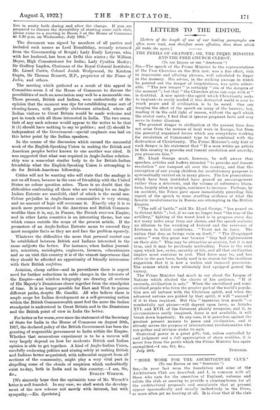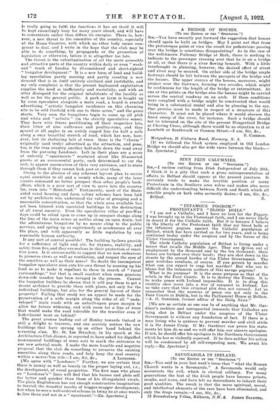"MORE WORK FOR THE ARCHITECTURE CLUB.' [To THE EDITOR OF
THE " SPECTATOR.") Sin,—In your last issue the foundation and aims of the Architecture Club are described, and I, in common with all those who care for the amenities of England, welcome and salute the club as seeming to provide a clearing-house for all the architectural proposals and complaints that at present appear spasmodically and usually ineffectively in the Press, or more often get no hearing at all. It is clear that if the club
Is really going to fulfil the functions it has set itself it will be kept exceedingly busy for many years ahead, and will have to concentrate rather than diffuse its energies. There is, how- ever, a new threat to the amenities of the country, especially of the Home Counties, with which no other body seems com- petent to deal, and I write in the hope that the club may be able to do something, by propaganda or the promotion of legislation or otherwise, before it is altogether too late.
The threat is the suburbanization of all the more accessible and attractive parts of the country within daily or even " week- end " reach of London by ill-considered and short-sighted "bungalow development." It is a new form of land and build- ing speculation partly meeting and partly creating a new demand that is in itself entirely civilized and justifiable, and my only complaint is that the present haphazard exploitation supplies the need so inefficiently and wastefully, and with an utter disregard for the original inhabitants of the locality as well as for the general public. A park or farm is bought up by some speculator alongside a main road, a board is erected advertising "artistic bungalow residences on this charming site to be sold freehold with one to three acres," and the game starts. Very soon the bungalows begin to come up all pink and white and " artistic " (in the strictly speculative sense). They have wire fences partitioning off their respective lots, their litter of zinc outhouses and poultry-runs, and they sprawl at all angles in an untidy ragged line for half a mile along a once beautiful stretch of road, which has now, how- ever, lost its sheltering belt of trees. Gone is the " charm " originally (and truly) advertised as the attraction, and gone, too, is the true country another half-mile down the road away from the pursuing Londoner. Left in their place are a score of unlovely " squatments " scattered about like ill-assorted guests at an unsuccessful party, each determined to cut the rest, to appear unconscious of their very existence, and to stare through them if they cannot look past or over them.
Owing to the absence of any coherent lay-out plan to secure equal amenities to all and a seemly whole, many of the later corners command no better prospect than other people's back- offices, which is a poor sort of view to move into the country For, even into " Metroland." Fortunately, most of the State- aided rural housing and farm colony schemes have been laid out by architects who understood the value of grouping and a reasonable concentration, so that the whole area available has not been littered with unrelated buildings to the destruction of all rural amenity. Even the speculative villas of pre-War days could be relied upon to come up in compact clumps along the line of the main sewer as nettles along an open drain, but the adventurous bungalows by no means cling to the public services, and spring up as capriciously as mushrooms all over the place, and with apparently as little regulation by any reasonable human authority.
Is any sort of control possible? The building by-laws provide for a sufficiency of light and air, for dryness, stability, and safety from fire, and they are zealous in their protection of sensi- tive noses. Is it unreasonable to suggest that we now endeavour to preserve views as well as ventilation, and respect the eyes of the sensitive as well as their noses? No doubt the incompetent bungalow speculator soon cuts his own throat by messing up his' land so as to make it repellent to those in search of "rural surroundings," but that is small comfort when some gracious down-side meadow has been ravaged in the process. Cannot the bungalow builders be shown that it will pay them to get a decent architect to provide them with plans, not only for the individual buildings, but also for the general lay-out of their property? Failing that could not an appeal be made for the preservation of a wide margin along the sides of all " unde- veloped " main roads with an unbuilt-upon grass margin to allow for future widening, and with room for a line of trees that would make the road tolerable for the traveller even if bedevilment went on behind?
The great avenue leading out of Henley towards Oxford is still a delight to traverse, and one scarcely notices the new buildings that have sprung up on either hand behind the screening elms. Mr. St. Lee Strachey, in his speech at the Architecture Club dinner, is reported to have asked for dignified monumental buildings of some sort to mark the entrances to our new arterial roads. I make the more humble and negative 'proposal that the club do something to preserve the existing amenities along these roads, and help keep the real country
within a motor-'bus ride.—I am, Sir, &c., A LONDONER.
[We agree with "Londoner." Further, we are certain that there is money as well as beauty in the proper laying out, i.e., the development, of rural properties. The first man who plans on "Londoner's" lines will find that his houses and plots sell far better and quicker than those of his ill-regulated rivals. The plain Englishman has not enough constructive imagination to foretell the dreadful results of hugger-mugger development, but when he sees a well-ordered scheme in being he at once wants to live there and not in a " squatment."—En. Spectator.]



































 Previous page
Previous page